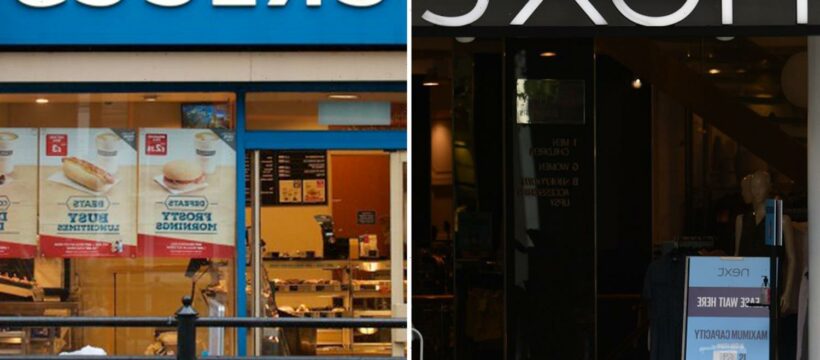RETAILERS including Next, B&M and Greggs are hiking prices in the latest blow for consumers as the cost of living continues to climb.
The high street chains have all confirmed that shoppers will have to pay more in stores.
Next confirmed yesterday that prices will be up 6% by the winter, and its spring and summer collections will be 3.8% more expensive.
It blamed the jump on increasing operating and wage costs.
Meanwhile Greggs has reportedly upped the price of some of its products by 5p or 10p, and is considering whether further hikes are needed.
Roger Whiteside, the bakery's chief executive, said staff wages had jumped 6.5% in the last year and ingredient prices have also risen, according to The Times.
"As expected, inflationary pressures increased towards the end of 2021 and are likely to remain elevated in 2022," the company said in a trading update yesterday.
Inflation is a measure of how much the price of goods, such as food or televisions, and services, such as haircuts or train tickets, has changed over time.
Most read in Money
THAT'S A WRAPMcDonald's confirms it is axing two popular menu items FOREVER
Thousands of Brits have just days left to apply for free boilers or insulation
PM set to slash VAT on energy bills for everyone – saving hundreds
Gas prices could ROCKET again if Russia invades Ukraine – what to do right now
Bargain retailer B&M is also affected, recently warning of supply chain and inflationary pressures this year.
Supermarkets are among the retailers hiking prices, the latest research shows.
Kantar revealed that grocery inflation hit 3.5% last month – adding £15 on to the bill of the average shopper.
The British Retail Consortium (BRC) said annual shop price inflation accelerated to 0.8% in December – up from 0.3% in November – in the second time prices have jumped since May 2019.
The Bank of England said inflation is expected to reach 6% by the spring and the BRC has warned that shop prices will "continue to rise, and at a faster rate" in 2022.
Helen Dickenson, the boss of the industry body, said: "Retailers can no longer absorb all the cost pressures arising from more expensive transportation, labour shortages and rising commodity and global food prices.
"Consumers will already be harder pressed this year, with rising energy bills, the looming hike in national insurance, and more expensive mortgagese.
"Government should relieve some of these costs by looking for long-term solutions for resolvable issues such as labour shortages."
We asked other shops including John Lewis, Poundland, Home Bargains, Sainsbury's, Morrisons, Tesco and Costa on their price plans but they either declined to comment or didn't respond.
How can I save money at the shops?
Keep an eye out for any sales, but make sure you only buy things you already planned to buy – otherwise you're not really making a saving.
Some retailers have secret sections on their online stores where you can find big discounts.
Amazon Warehouse sells returned goods at discounted prices and shoe shop chains Office and Schuh have discount sites where shoppers can buy display pairs at reduced prices.
Before you buy something online, check your emails or voucher websites to see if there are any valid money off codes that could help you get a cheaper price.
Buying second-hand is also a tried and tested way to get clothes, toys, books and homeware for less.
If you're worried about the impact of inflation on your supermarket shopping, you could switch to a cheaper grocery store.
Aldi and Lidl are often cheaper than other supermarkets.
You should also make sure you're making the most of any loyalty card schemes available.
For example, if you're a Tesco shopper you'll be able to save money of hundreds of items if you have a Clubcard.
Grocers also sell discounted foods at certain times of day – check out our guide to the best time to shop for yellow sticker items.
Source: Read Full Article





